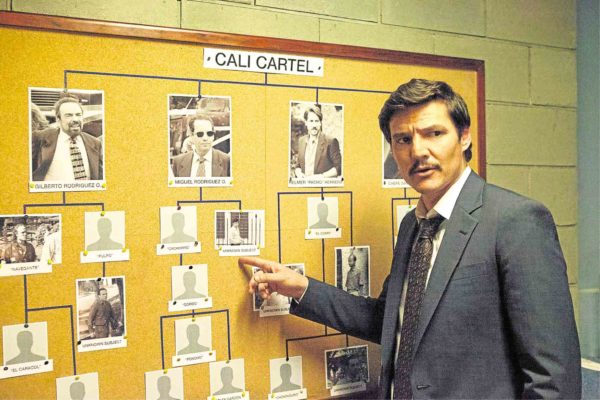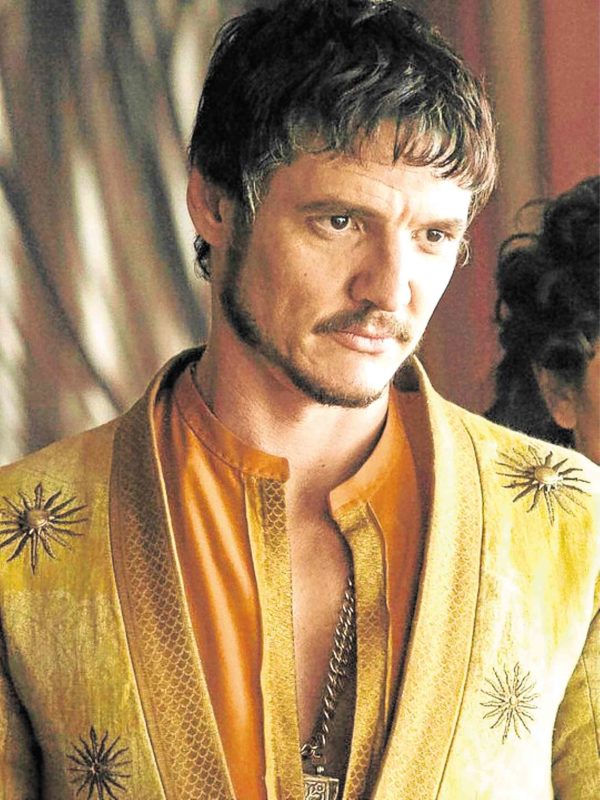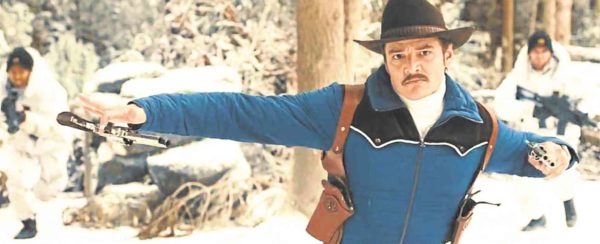Pedro Pascal on the war on drugs: It’s more a health than a criminal issue

Pedro Pascal in “Narcos”
BOGOTA, COLOMBIA—Can the war on drugs be won? Not by law enforcement agencies alone, wrote former Colombian president Cesar Gaviria in the New York Times in his Feb. 7 article, “President Duterte is repeating my mistakes.”
Unsurprisingly, the South American leader’s “unsolicited advice” drew the ire of the tough-talking Philippine President. But, Gaviria knew whereof he spoke: It was during his four-year regime that saw the end of the violent reign of drug lord Pablo Escobar and the ruthless Medellin Cartel.
In the Season 2 finale of Netflix’s acclaimed drama “Narcos,” we saw Escobar (portrayed with transfixing conviction by Wagner Moura) finally getting his comeuppance, after he was shot dead by police operatives the day after he turned 44 years old, in 1993.
Like a big elephant in the room, the aforementioned question was raised repeatedly when we flew to Bogota last week for a series of one-on-one and panel interviews with the exceptional actors of “Narcos’” Season 3, led by the charming Pedro Pascal, who reprises the role of DEA (Drug Enforcement Administration) agent Javier Peña.
For Pascal, the so-called “war on drugs” doesn’t have to be treated with a heavy hand.
“It’s easy to go about this the wrong way,” he told Inquirer Entertainment. “I think drug addiction is more a health issue than a criminal one. If we see [the problem] that way, there would be less criminalization of the drug culture. People are going to do drugs, anyway—and there’s nothing you can do about it.”
Then, as if noticing how serious his statement sounded, Pascal quipped, “You know what? I’m just an actor. I’m not getting myself into hot water with this sh*t (laughs)!”
The 10-episode third season of “Narcos” shifts its gimlet-eyed focus from Escobar to the “gentlemen quartet” of the Cali Cartel made up of brothers Gilberto (Damian Alcazar) and Miguel Rodriguez Orejuela (Francisco Denis), Chepe Santacruz (Pepe Rapazote) and their gay narcotrafficking colleague Pacho Herrera (Alberto Ammann).

Pascal in “Game of Thrones”
Following the death of Escobar in 1993, the Cali Cartel controlled over 90 percent of the world’s cocaine market. The “most powerful crime syndicate in history,” as the DEA once described it, operated as a tight group of independent criminal organizations.
The fearsome foursome’s shared stories wouldn’t be as compelling without the crucial “participation” of the cartel’s chief accountant Guillermo Pallomari (Javier Camara) and head of security Jorge Salcedo (Matias Varela, in a career-boosting turn), his wife Paola (former Miss Colombia Taliana Vargas), money launderer Franklin Jurado (Miguel Angel Silvestre) and Miguel Rodriguez’s sinister son David (Arturo Castro).
Here’s a tip for “Narcos” fans: Take note of the character of Amado Carrillo (Jose Maria Yazpik), who’s expected to play a pivotal role in Season 4.
Our Q&A with Pascal:
The series disproves the idea that the public would never watch shows with subtitles. Have you gotten a sense that that attitude has changed in Hollywood? Initially, I thought the show would be shot with characters speaking in Latino-accented English.
Then, Netflix insisted that Spanish-speaking characters had to deliver dialogue in Spanish—which meant that Wagner (Moura, the Portuguese- and English-speaking Brazilian actor who played Escobar) had to learn Spanish (laughs)!
Something like that is needed to achieve a certain amount of authenticity. I don’t know if it’s changing things; I just know that it can be done.
And it makes for better storytelling if cultural representation is done well.

Pascal in “Kingsman: The Golden Circle”
You spent a lot of time shooting in Colombia. What changes have you noticed since you began doing the series here? That’s hard to answer. The usual impression is that of political unrest or violence. But, I came here with my family when I was 13 years old. It seemed like people were living “normal” lives. We were strangely accustomed to the fact that bombs were going off in Bogota.
Then, I came back in 2011 to do a TV movie for the USA Network and, again, I had a nice time. I made a lot of friends, went to parties and became familiar with the country’s cool hipster scene.
When we shot “Narcos,” my experience of living in Colombia seemed in complete contrast to the sort of stories that were being told about it. I never felt like I was in danger. And, I’d rather go for a walk in the afternoon here than park too far away from my apartment in LA after midnight.
How did you prepare for your role as Javier Peña? From the very beginning, it involved arduous, in-studio sessions with (showrunner) Eric Newman—to get the right tone and make Javier accessible, because he’s really not much of a talker. He isn’t somebody who wants to tell the story. He’s just “forced” into it.
With someone like Peña, you’re careful not to “betray” your character in the show’s narration. In that regard, Boyd (Holbrook, who portrayed DEA agent Steve Murphy in the series’ first two seasons) did a great job, because he had a sexy voice and a southern twang I couldn’t emulate (laughs).
Was there a conscious effort to tweak the tone for the series’ latest season? The shift was inevitable because the Cali Cartel is very different from its counterpart in Medellin.
In the first two seasons, Pablo Escobar was the anchor that held everything together. He was a drug czar, so we were fighting one king who was in control of the whole industry.
With the Cali Cartel, it was about four godfathers, so that changed the dynamic of the series’ narrative structure considerably, because the story is much more complex and sprawling. The truth is, after Escobar, the cocaine industry in Colombia and the world grew, and the Cali cartel had more money, power and a wider reach. The situation became even more unpredictable.
When people approach you in the streets, do they talk about “Narcos’” Javier Peña or “Game of Thrones’” Oberyn Martell, who became more famous because of the death scene that is now widely considered the fantasy show’s most violent? It depends on where I am. After I finished shooting Season 2 of “Narcos” here, I went straight to the UK and started working on “Kingsman: The Golden Circle.”
That was when I started to feel the popularity of “Narcos.” They’d come up to me and say, “ … Javier Peña (with a British twang)?” So, I was like, “Wow, I’ve already graduated from Oberyn to Javier (laughs)!
People who ask me about [my character’s gruesome death in] “Game of Thrones” just want to stick their thumbs into my eyes (laughs).
Escobar has become a pop-culture figure—he’s in films, books, TV shows, etc. Don’t you think it’s risky to have a “romanticized,” sensationalized view of him? I wouldn’t say that “Narcos” glamorizes or idealizes Escobar and the drug culture—I don’t think that’s the show’s intention.
The truth is, his story is sensational, fantastical, even stranger than fiction. So, for some people, there’s so much seduction there. It tells his story, but it doesn’t make me want to sniff cocaine or want to be a drug dealer.
Were you happy about how things were handled in the just concluded seventh season of “Game of Thrones”? I have yet to see the last episode, so if you’re about to say anything about it, stop right now … (laughs)!
“GoT” showrunner David (Benioff) is a genius because he knows how to tell its story without getting stuck in the source material—which makes it a better show.
George RR Martin is probably going to kick my ass for saying that (laughs) …
How are you feeling about the eagerly anticipated release of “Kingsman: The Golden Circle”—your most high-profile big-screen project? Well, it gathered a group of out-of-work actors who finally got a job: Halle Berry, Julianne Moore, Jeff Bridges, Colin Firth, Mark Strong, Elton John, Channing Tatum—it’s a very small cast (laughs). I was very patient with them. I was able to share my knowledge and experience, so I think they’ll come out OK. They’ve learned a lot from me (laughs).
Seriously, I’m very excited about it! It was overwhelming. I got that job because (director) Matthew Vaughn saw the first season of “Narcos.” He got a little OC (obsessive-compulsive) with my character, so he put me through an extensive casting process (laughs). It was his impression of Javier Peña that inspired him to start shaping my character, Agent Whiskey—and I couldn’t be happier about it.